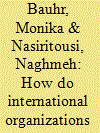|
|
|
Sort Order |
|
|
|
Items / Page
|
|
|
|
|
|
|
| Srl | Item |
| 1 |
ID:
123626


|
|
|
|
|
| Publication |
2013.
|
| Summary/Abstract |
Does perceived corruption in recipient countries reduce support for foreign aid in donor countries? This under-explored yet salient question is examined using the 2009 Eurobarometer survey for the 27 EU countries. We suggest that perceived corruption can cause aid fatigue but that this relationship is highly contextualized. The results show that perceptions about corruption in developing countries reduce overall support for aid among respondents in donor countries. However, this effect is mitigated by country and contextual-level effects and different understandings of what we call the "aid-corruption paradox," namely that the need for foreign aid is often the greatest in corrupt environments. Three different dynamics of the aid-corruption paradox influence support for aid: moral, pragmatic, and strategic understandings. In EU-15 countries, the effect of perceived corruption in recipient states on aid fatigue can be substantially altered if aid is motivated by moral reasons for helping poor countries or if the purpose of aid is understood to improve governance. In new member states (NMS-12), the effect is reduced if respondents believe that the result of aid can serve national interests. The results provide new insights into the public opinion/development policy nexus, which suggest a number of salient policy recommendations and future areas for research.
|
|
|
|
|
|
|
|
|
|
|
|
|
|
|
|
| 2 |
ID:
117452


|
|
|
|
|
| Publication |
2012.
|
| Summary/Abstract |
How do international organizations (IOs) promote quality of government (QoG) and reduce corruption? IOs play a central role in most accounts of power in international relations. However, our understanding of how IOs exercise power seldom moves beyond the traditional material-normative dimensions of power. We suggest that an important dimension to understand IO power is the contestation-integration dimension, where IOs can exercise power either by integrating countries into networks of cultural exchange or by contesting existing orders. By analyzing multilateral aid data and building on recent advances in our understanding of the effectiveness of IO anti-corruption work, we apply this framework to show how the contestation-integration dimension helps us understand the success or failure of anti-corruption strategies. We show that when IOs contest existing orders using governance rankings and aid conditionality, they suffer from ideational shortcomings, including lack of objective data and contested policy advice. In contrast, measures based on integration, such as the membership process of IOs or interaction with IOs, are more likely to suffer from internal procedural shortcomings, such as IOs failing to internalize and mainstream the norms that they seek to promote. Our findings have implications for both understanding conditions that limit the diffusion of the international anti-corruption agenda and advancing our knowledge of IO power and its limits.
|
|
|
|
|
|
|
|
|
|
|
|
|
|
|
|
| 3 |
ID:
175035


|
|
|
|
|
| Summary/Abstract |
Sustainable Development Goal 7 and the Paris Agreement reiterate the importance of a worldwide uptake of renewable energy. However, the present growth rate of renewables in the global energy mix is too slow to meet international targets. There exists at present a wide range of institutions with different characteristics that work internationally to promote a steeper increase. Whereas previous studies have examined the institutional landscape for renewable energy and the considerable interactions occurring across institutions, it remains unclear what the implications of these institutional interactions are for effectiveness. This paper assesses how institutional interactions can strengthen effectiveness, by focusing on three multi-stakeholder partnerships for renewable energy. Based on an expert survey and semi-structured interviews, the study provides both theoretical and empirical contributions to understanding institutional interactions in relation to effectiveness. Moreover, it provides insights on how to strengthen the effectiveness of multi-stakeholder partnerships for renewable energy. Results show that different levels and types of institutional interactions may influence effectiveness differently, with the sharing of procedural information and coordination mechanisms being considered most fruitful to increase effectiveness. Importantly, however, such interactions should not harm the autonomy, nor the efficiency of multi-stakeholder partnerships.
|
|
|
|
|
|
|
|
|
|
|
|
|
|
|
|
| 4 |
ID:
179329


|
|
|
|
|
| Summary/Abstract |
The legitimacy of international institutions has in recent years received growing interest from scholars, yet analyses of stakeholder perceptions of the legitimacy of institutions that coexist within a governance field have been few in number. Motivated by the proliferation of institutions in the field of global climate and energy governance, this study maps stakeholder perceptions of legitimate institutions and their sources of legitimacy in global renewable energy governance. Specifically, the article makes three contributions to the existing literature. Theoretically, it unpacks the legitimacy concept and offers a multidimensional conception of legitimacy. Methodologically, it captures these different dimensions of legitimacy by relying on three open survey questions. Empirically, it maps legitimacy perceptions among climate and energy experts and not only shows which institutions are considered most legitimate, but also why they are considered legitimate and how this varies between different stakeholders. The article thereby contributes to the literature on legitimacy by providing new insights into the sources of legitimacy among international institutions that operate under institutional complexity.
|
|
|
|
|
|
|
|
|
|
|
|
|
|
|
|
|
|
|
|
|